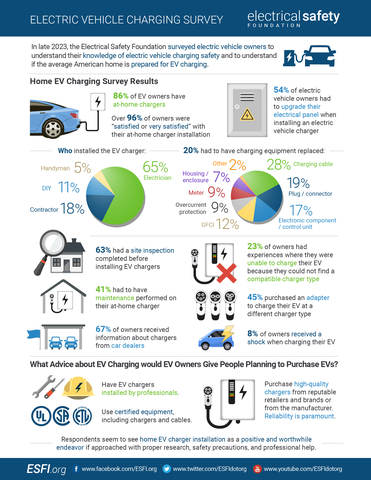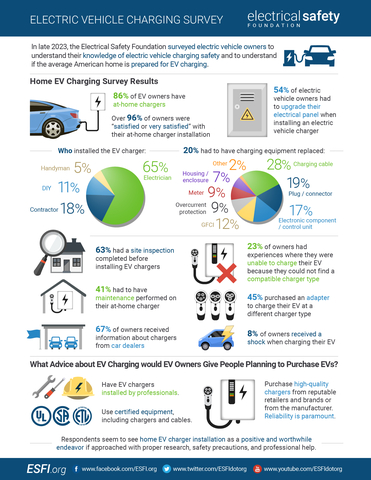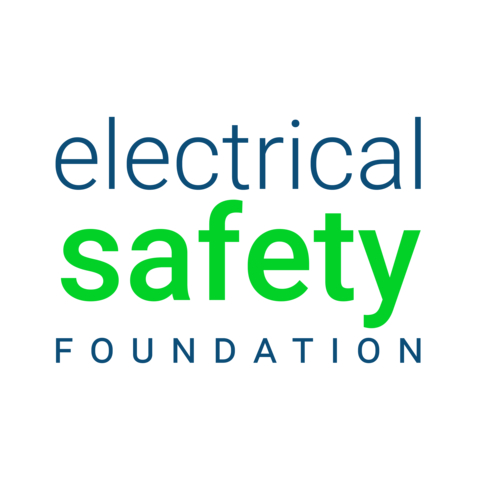ARLINGTON, Va.--(BUSINESS WIRE)--The Electrical Safety Foundation (ESFI) recently surveyed electric vehicle (EV) owners to gauge their understanding of EVs and electric vehicle supply equipment (EVSE), or EV charging stations and chargers. The goal of the survey was to identify safety gaps related to emerging technology to ensure consumers are safe while operating and charging their EVs. The survey results show that over 50% of the electrical systems in homes are not ready for EV charging.
Survey respondents agreed that safety needs to be the top priority when installing and using EVSE. The majority of EV owners – 75% – have not had any charging issues, but 8% have received an electrical shock. Several responses highlighted various safety considerations, from the installation location to the use of certified equipment. Several respondents stressed the importance of choosing a high-quality charger from a reputable source. There is a clear need for information regarding charging EVs safely. Nearly one-third of owners surveyed did not receive information related to charging before purchasing their EV. ESFI’s EV resources can be utilized to ensure consumers have the safety information they need to keep themselves safe.
The survey respondents also stressed the importance of conducting thorough research before purchasing and installing EVSE, as well as hiring a qualified EV installer to complete the installation process. “Older homes may not be able to safely handle EV charging without overloading the home’s electrical system,” said ESFI President Brett Brenner. “ESFI urges consumers to have a qualified electrician complete an assessment on their home before purchasing or installing EVSE to ensure their electrical system can withstand the demands of EV charging.”
When respondents were asked about preparing their homes for EVs, 63% said they scheduled a home inspection before EVSE installation, while 54% needed an electrical panel upgrade. Many respondents mentioned the convenience of having a home EV charger, focusing on the benefit of charging overnight and eliminating reliance on public charging stations, as many cited problems with finding available charging stations. This included a general scarcity of charging stations, stations occupied by non-EVs, or stations in inconvenient locations. Respondents expressed dissatisfaction with the time it takes to fully charge an electric vehicle, which is problematic when charging infrastructure is scarce or while on a long trip.
ESFI recommends only using manufacturer-approved charging cables. Non-approved adapters can bypass safety features installed in manufacturer-approved chargers. They can also cause shocks, fires, and even damage your car’s battery. When respondents were asked about EV adapters, 45% said they had purchased an adapter, while 53% had not. “We are encouraged by the survey findings, as customer safety is our top priority as we seek an electrified future,” said John DeBoer, head of Siemens eMobility, North America. “We advise the public to only purchase certified equipment from trusted sources, check electrical manufacturers' websites, and find authorized retailers and installers.”
As the trusted voice for electric safety, ESFI strives to keep consumers safe as they utilize emerging technology, including EVs. ESFI reminds consumers to follow the manufacturer’s instructions when charging an EV. Inspect your charger prior to charging, and never use it if it’s damaged. Extension cords should never be used; only use manufacturer-approved charging cables. Don’t alter or modify your charger, battery, or electric vehicle. Always remember to properly store your EV charger to avoid water and other damage. When parking in a public EV charging spot, be aware of your surroundings so you don’t run into a charger. For additional free EV safety resources you can share throughout your community, visit esfi.org.
ABOUT ESFI
The Electrical Safety Foundation is a 501(c)(3) non-profit organization dedicated to promoting electrical safety at home and the workplace. For more information, visit esfi.org.




